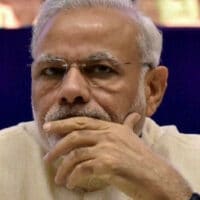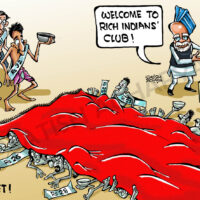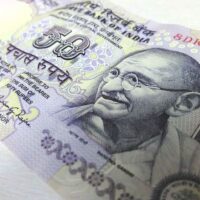-
The OPEC’s decision to cut oil output
WHAT is called OPEC+, that is the 13 members of the Organisation of Petroleum Exporting Countries (OPEC) together with 11 other petroleum exporting countries led by Russia, decided on October 5 to cut their oil production by 2 million barrels per day, starting from November. The U.S. had been pressing OPEC not to take this decision.
-
Acceleration in Eurozone inflation rate
FOR the first time ever, the annual rate of inflation in the Eurozone, measured by the Consumer Price Index, has reached double digits: it exceeded 10 per cent in September 2022, up from 9.1 per cent in August.
-
The new threat on the Foreign Exchange front
ON September 23, the value of the rupee vis-a-vis the dollar fell to a new low: it crossed 81 to a dollar after some weeks of relative stability when it hovered between 79 and 80.
-
Europe’s economic Hara-Kiri
It is not just the immediate effect on Europe that threatens to be severely adverse; capital has already started relocating away from Europe to the United States, a trend that will inevitably gather momentum, so that long-term growth and hence employment prospects on that continent will also be affected.
-
Controlling inflation at the expense of working class
ECONOMISTS distinguish between two kinds of inflation: “demand-pull” and “cost-push”.
-
Sanctions and the decline of the dollar
The hegemony of the U.S. dollar was based on the fact that the world’s wealth-holders considered it to be “as good as gold”, even when it was no longer officially convertible to gold at a fixed rate, as it had been under the Bretton Woods system, after the collapse of that system.
-
The Indian economy since Independence
The post-colonial state in India had two primary tasks before it: one was to overcome the hegemony of metropolitan capital, so that a development strategy in relative autonomy from imperialism could be pursued; the second was to attack landlordism both to free the agrarian population from its clutches, and to increase agricultural output for rapid industrialisation based on a growing home market.
-
Scandinavia and imperialism
There are many misconceptions about Scandinavian capitalism. A very common one is the belief that since the Scandinavian countries developed vigorous capitalist economies, without ever having acquired any colonies of their own, they constitute a clear refutation of the claim that capitalist development necessarily requires imperialism.
-
“Heads I Win, Tails You Lose”
To look at neo-fascism withoutits economic moorings, to ignore the fact that the neo-fascist government is actually based on a neo-liberal-neo-fascist alliance, and, in general, to look at politics as a self-contained sphere unconnected to the economy, is a liberal trait that the Left must not imitate.
-
The Indian economy is heading for a stationary state
ADAM Smith and David Ricardo had been haunted by the idea of capitalism ending up in a “stationary state”, by which they meant a stable state of zero growth.
-
Neo-liberalism and anti-inflationary policy
Central banks all over the capitalist world are raising, or are about to raise, interest rates as a means of countering the currently rampant inflation, which is certain to push a world economy that is barely recovering from the effect of the pandemic, back towards stagnation and greater unemployment.
-
Reflections on the Sri Lankan economic crisis
The American establishment and the new cold-warriors of that country put the blame on the Sri Lankan government’s developing close economic relations with China (and we shall no doubt hear much more of it in the coming days); others blame the sheer “irresponsibility” of the government which is accused of “sleeping” when Sri Lanka’s external debt was building up.
-
Tendency towards the emergence of an “international” middle class
The chancellor of the exchequer of Britain, whose official residence is only next door to the British prime minister’s, is Rishi Sunak, a person of Indian origin. Britain’s home secretary is Priti Patel, also of Indian origin.
-
The inhumanity of capitalism
For over two years now, the world has been facing a pandemic the like of which has not been seen for a century, and which has already taken 15 million lives according to the WHO, without being anywhere near an end.
-
Food and decolonisation
RUSSIA and Ukraine together account for 30 per cent of the world’s wheat exports. Many African countries, in particular, are heavily dependent on them for their food supplies, which are now getting disrupted because of the war; and this disruption would continue since the war is also affecting the acreage being sown under foodgrains there.
-
Reflections on the Sri Lankan economic crisis
The American establishment and the new cold-warriors of that country put the blame on the Sri Lankan government’s developing close economic relations with China (and we shall no doubt hear much more of it in the coming days); others blame the sheer “irresponsibility” of the government which is accused of “sleeping” when Sri Lanka’s external debt was building up.
-
The irony of sanctions against Russia
The juggling which U.S. imperialism has to do to maintain its hegemony becomes more bizarre by the day. First, it kept needling Russia (“provoking the bear”) “on behalf of the western alliance” by expanding NATO to its very borders, knowing full well that Ukraine’s joining NATO would be totally unacceptable to Russia.
-
Globalisation and the relocation of capital and labour
The twin phenomena associated with contemporary globalisation, of migration of capital from the metropolis to parts of the third world, and of migration of labour from the erstwhile second world to the metropolis, have the effect of weakening the working class movement everywhere.
-
Sanctions within a regime of neo-liberalism
Before joining the neo-liberal order, India used to have “rupee payment arrangements” with the Soviet Union and Eastern European socialist countries under which the main international reserve currency, the U.S. dollar, was used neither for settling transactions nor even as the unit of account in terms of which the trade-related transactions were denominated.
-
The IMF connection with the Ukraine crisis
THE security concerns of Russia arising from Ukraine’s intentions of joining NATO have been widely discussed in the media. But the IMF’s link with Ukraine which is a parallel issue has scarcely received much attention.




















